Curcumin, the super ingredient inside turmeric, is a trendy herb that has powerful anti-inflammatory properties and helps cognitive function.
Why does this super ingredient have so much buzz? It helps the human condition in so many ways: From the appearance of your skin to fighting depression and boosting bone density.
While the benefits of curcumin seem too good to be true, curcumin is still a recent discovery in the world of nutrition. Our researchers took a close look at the latest science to determine the best curcumin supplements on the market.
Research
Rankings
Last updated: June 10, 2023
Curcumin supplements considered: 18
Hours of research: 43
Experts reviewed: 7
Scientific papers referenced: 34
1. 1MD Advanced Turmeric Curcumin X285
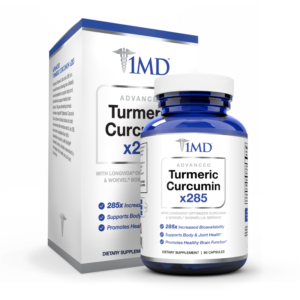
Click here for the lowest price
For those who’re serious about taking the best curcumin supplement, Advanced Turmeric Curcumin X285 is the most potent you can get.
They also have the endorsement of a prolific cardiologist, Dr. Michael Fenster, who says “As a board-certified cardiologist, I stand behind 1MD’s Advanced Turmeric Curcumin x285 formula which combines two clinically studied, patented ingredients, Longvida Turmeric Curcumin and WokVel Boswellia Serrata, both clinically shown to boost systemic health.”
From alleviating joint pain to providing your body with more energy, Advanced Turmeric Curcumin X285 is one of the better daily regimes you can have in the supplement space.
All natural, and made in the USA in an FDA-approved facility.
The all-around curcumin winner of the year.
Click here for the lowest price
2. NatureWise Curcumin
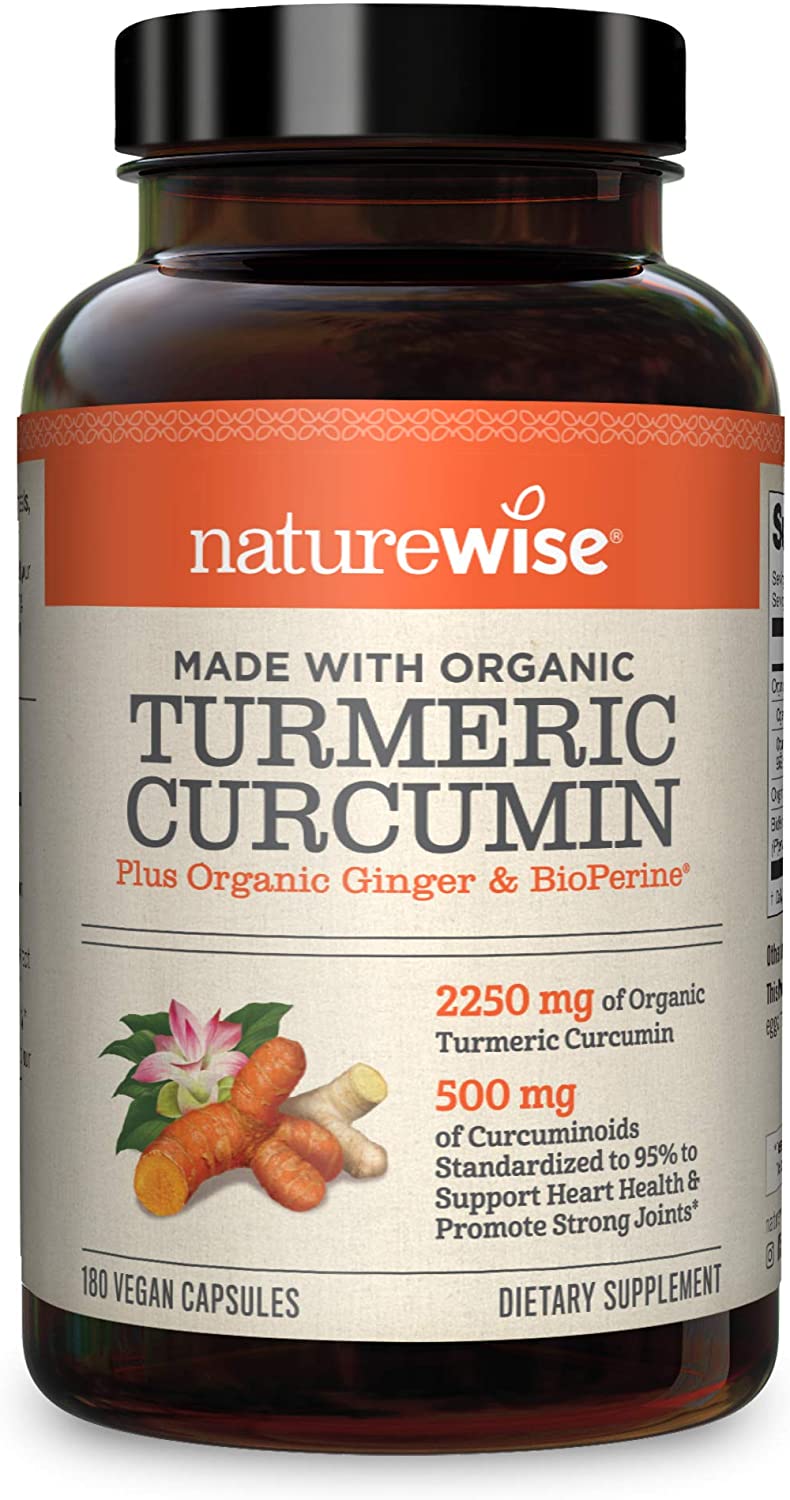
At 750 mg of curcumin per capsule, NatureWise has a high dosage, plus a few extras. There is ginger root extract, which is another powerful antioxidant, and the familiar black pepper extract for absorption and efficacy, but this supplement doesn’t get bogged down with excess ingredients either.
3. Solgar Full Spectrum Curcumin
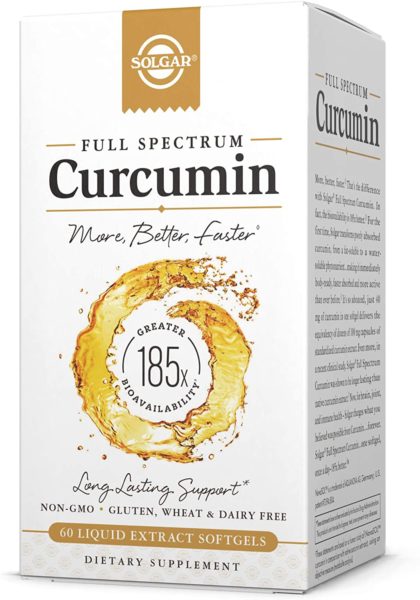
Solgar takes a unique approach to their curcumin supplement. Instead of the standardized extracts used by other companies, Solgar has a special liquid extract they claim is 185x more effective.
As such, the dosage per capsule is far lower. Solgar has a good track record as a supplement company, so the odds are good that they are correct in their assertion.
4. BioSchwartz Turmeric Curcumin
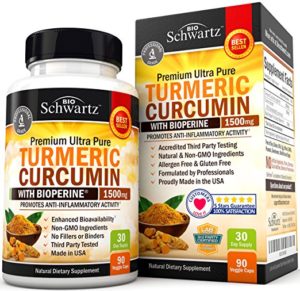
BioSchwartz provides a solid dose of curcumin from a trusted brand. At 500 mg per vegetarian capsule, you can tailor your dosage to meet the right dosage for you. It also includes bioperine, a black pepper extract which helps boost the absorption and bioactivity of the curcumin.
5. Jarrow Formulas Curcumin 95
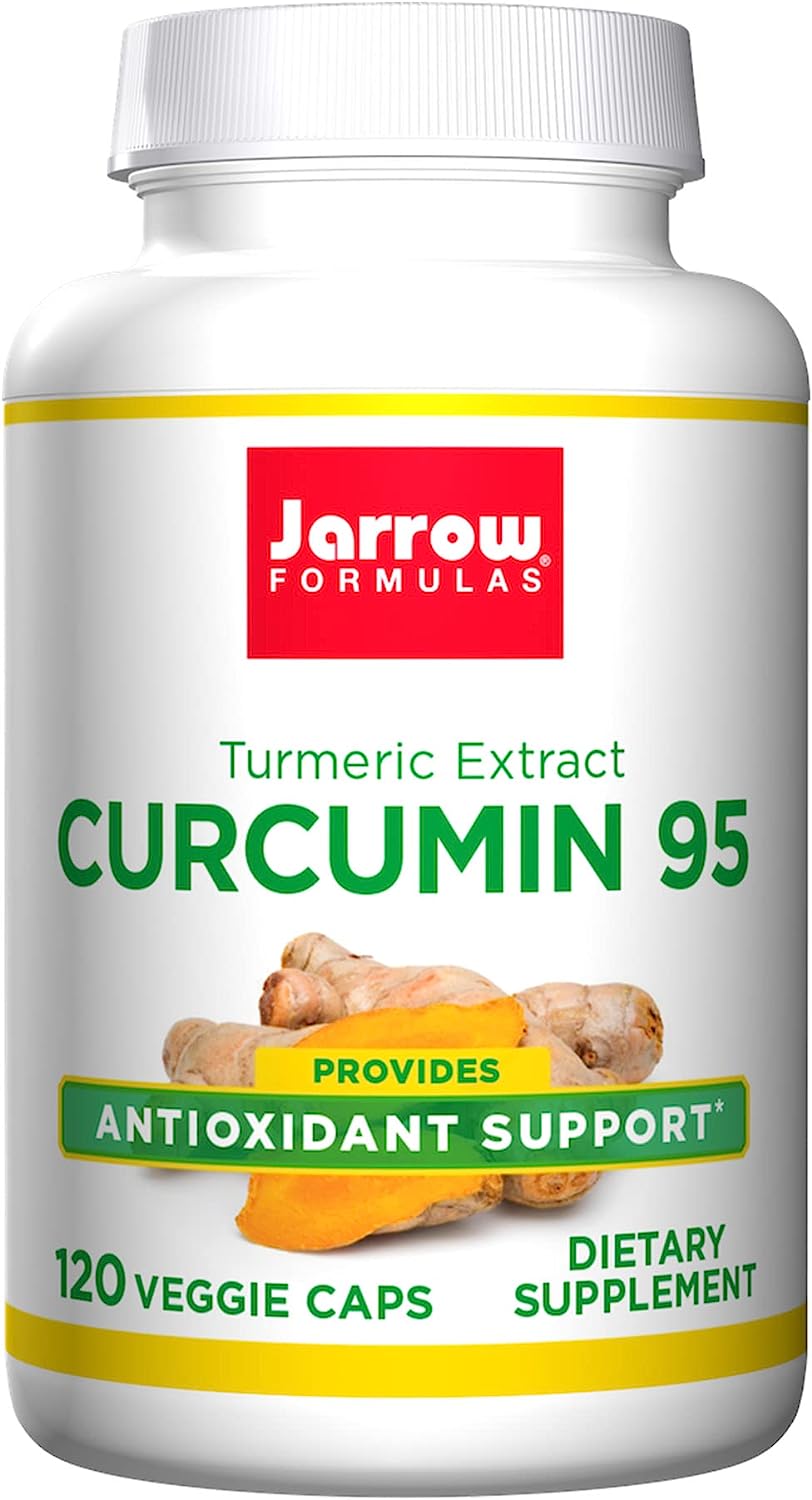
If all you want is a reasonable dose of curcumin without any added supplements, Jarrow Formulas should be your go-to option. It has 500 mg of curcumin per capsule, and aside from the necessary ingredients for the cellulose-based capsule, zero other ingredients.
6. Now Curcumin
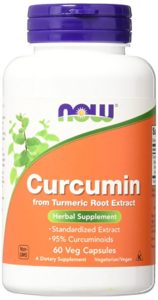
Now Curcumin offers a bulk-buy no-nonsense curcumin supplement. With 665 mg of curcumin per capsule, the dosage is good, though it doesn’t have bioperine like some of the other curcumin supplements out there. Not interested in black pepper extract? Now Curcumin is a great choice.
7. Doctor’s Best Curcumin
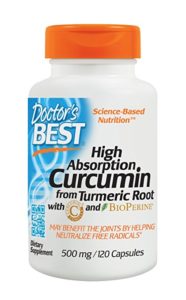
Doctor’s Best provides a similar level of curcumin to other supplements on the market, and it also includes bioperine (black pepper extract) for better absorption. It doesn’t distinguish itself in any particular way, though, so it doesn’t land any further up in the rankings.
8. Nature’s Nutrition Turmeric Curcumin
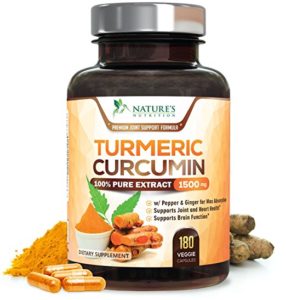
Nature’s Nutrition has 700 mg of curcumin per capsule, and the standard black pepper extract. The only curiosity is that Nature’s Nutrition used their own in-house black pepper extract instead of the commercialized BioPerine used by most other companies.
9. Doctor Recommended Supplements Turmeric Curcumin
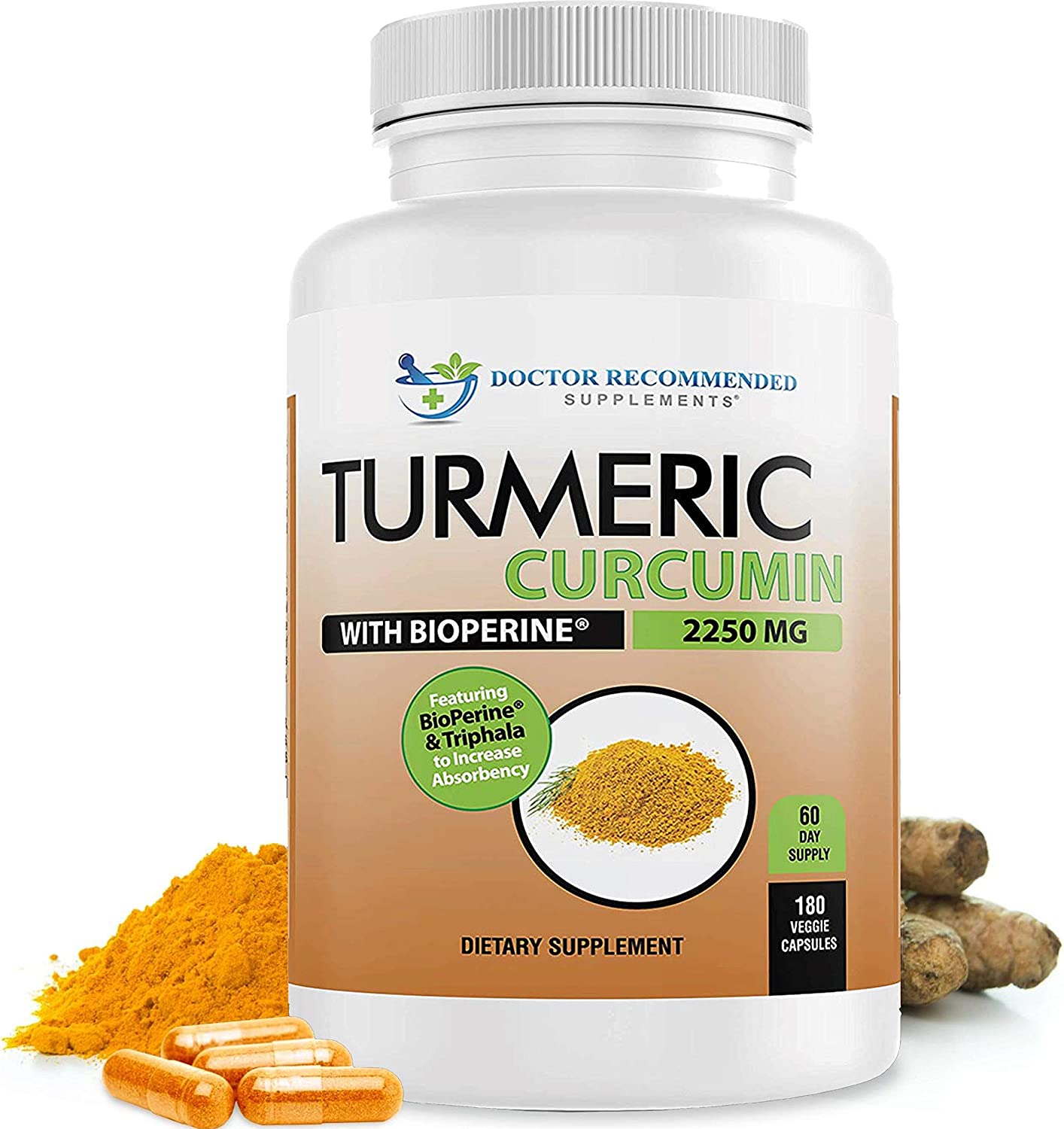
While the label says each serving contains 750 mg, you’ve got to read the fine print. The active ingredients of this supplement are mixed into a “proprietary blend” which has several sources of curcumin with varying levels of purity, and also includes triphala powder. So you don’t really know how much curcumin is in each capsule.
10. Life Extension Curcumin Elite
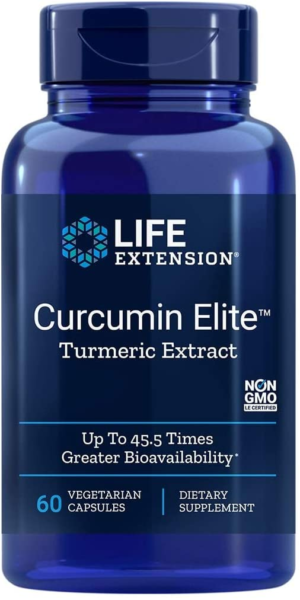
At 500 mg of curcumin per capsule, Life Extension provides a similar dose of curcumin to many of its competitors. However, its curcumin is incorporated into a proprietary blend that includes other ingredients, like fenugreek, which may cloud its efficacy.
Category winners
Best curcumin overall: 1MD Advanced Turmeric Curcumin X285
If you want a versatile and effective curcumin supplement, look no further than 1MD. Its dual combination of curcumin and boswellia extract make it equally well-suited for combating inflammation, oxidation, and joint pain.
Best curcumin for inflammation: NatureWise Curcumin
NatureWise Curcumin boosts the anti-inflammatory effects of its curcumin supplement in two ways: it uses black pepper extract to increase absorption, and it includes ginger extract to augment the supplement’s potency against inflammation. It’s great for keeping painful inflammation at bay.
Best curcumin for weight loss: BioSchwartz Turmeric Curcumin
Research to date on using curcumin for weight loss tends to use a pretty high dose, and pairs this dose with black pepper extract. BioSchwartz is the closest thing you can find on the market to what’s being used in the latest scientific research, making it our recommended pick for weight loss.
Best curcumin for mental wellness: Jarrow Formulas Curcumin 95
Scientific research on using curcumin to improve mental health and treat depression has followed a strict dosage protocol. Jarrow Formulas Curcumin 95 is the best supplement on the market if you want to mimic the methods of these studies; its 500 mg dose is just right, and it has zero other active ingredients.
Best curcumin for joint pain: 1MD Advanced Turmeric Curcumin X285
The combination of curcumin and boswellia gives 1MD the edge over the competition when it comes to joint pain—boswellia’s pain-relieving properties make it a nice complement to the anti-inflammatory properties of curcumin. For aching knees, ankles, or hips, 1MD should be your first choice.
Best curcumin with black pepper: NatureWise Curcumin
Need maximum curcumin absorption? Black pepper extract can boost the bioavailability of curcumin, and NatureWise Curcumin is the best way to achieve this. The 5 mg of black pepper extract in each capsule ensures peak curcumin absorption.
Who should buy curcumin?
Curcumin is a powerful antioxidant that provides many of the health benefits found in turmeric. It has found use in a wide variety of applications, all of which are linked to high levels of systemic inflammation. Here are the biggest ones:
People who want to reduce their risk factors for chronic disease. Many chronic diseases like heart disease and type 2 diabetes are rooted in inflammation, and curcumin has been shown to reduce inflammation-related risk factors like high blood pressure and poor blood sugar control.
People who want better cognitive function, especially in old age. Curcumin has been studied both for short-term cognitive benefits and for staving off dementia and other aging-related declines in cognitive function. Again, its potential use here is linked to its anti-inflammatory properties.
Athletes looking to boost recovery after tough training sessions. Though inflammation is implicated in a lot of chronic diseases, it’s also the cause of pain and soreness after difficult workouts. Some athletes use curcumin to boost recovery after their most intense gym sessions.
People who want to boost their mood and combat depression. Unusually among anti-inflammatory supplements, curcumin also boosts mood and has been used in medical research to combat depression, and finds use among nootropic supplement enthusiasts not just as a cognitive enhancer but as a mood elevator as well.
How we ranked
Unlike turmeric supplements, which are focused more broadly on the entire range of biologically active compounds found in raw turmeric, curcumin supplements focus only on delivering the curcumin molecule. As a result, we used these highly purity-focused criteria for our rankings:
Curcumin purity as the top priority. We only examined supplements that were focused primarily on curcumin; more general antioxidant supplements that happened to include curcumin alongside other biologically active ingredients did not make the cut.
High-potency anti-inflammatory effects. Since potency is important with curcumin, we only analyzed the curcumin supplements that had the highest dosage. After dropping low-dose supplements from consideration, we looked for the presence of other potentially helpful ingredients which could enhance the activity of the curcumin.
Black pepper extract for better bioavailability. Most salient among these extra ingredients was black pepper extract, sometimes marketed commercially as BioPerine. We looked for this ingredient because there are good scientific studies that have validated black pepper extract’s ability to enhance the absorption and bioavailability of curcumin.
Clean supplement design with no filler. Beyond just chemically active ingredients, we also cared about the overall purity and quality of the supplements’ design. Products that used a lot of binders, fillers, and excipients scored lower, while pure, simple products scored higher.
We noted whether a particular product used vegan-friendly cellulose in their capsules, or gelatin, but only had a small influence on the overall score of a product.
After sorting the remaining products by their overall score, we had our final rankings. These represent the best curcumin that’s available right now, and are all excellent options for a supplemental strategy to boost your long-term health.
FAQ
Q: Are turmeric and curcumin the same thing?
A: No, turmeric is not the same thing as curcumin, though they are related. Turmeric is a plant that’s similar to ginger; when people are talking about turmeric, they are usually talking about the powderized version of the turmeric root, which looks just like a yellow-orange version of ginger root.
Turmeric supplements include either the whole raw powder, or use an extracted version of this powder. Curcumin, on the other hand, is one of the chemical constituents of turmeric, and is what gives turmeric its deep yellow-orange color.
Curcumin is a single individual molecule, and many nutrition experts believe that curcumin is the reason that turmeric has so many health benefits.
In practice, all turmeric supplements will contain curcumin, and many (though not all) curcumin supplements also contain other biologically active compounds in turmeric as well.
Q: What is curcumin used to treat?
A: Curcumin is an extremely potent antioxidant and anti-inflammatory, which means that it finds use in a wide range of conditions that are linked to systemic inflammation.
Curcumin fights against ulcerative colitis, rheumatoid arthritis, and osteoarthritis, all of which are directly linked to undesirable inflammation.
Likewise, curcumin has been found to exert benefits on blood pressure and type two diabetes, which are also thought to be linked to chronic inflammation. Curcumin has also been used successfully to ameliorate symptoms of depression, though in this case it’s not clear whether the benefit is from anti-inflammatory effects or from something else.
Curcumin is known to exert benefits in at least some domains beyond its inflammation and oxidative damage fighting abilities, though; it boosts bone density by altering specific gene expression pathways related to bone microarchitecture. These are broad categories, but they are a testament to the vast utility of curcumin.
Q: How much curcumin is in turmeric?
A: According to a 2006 study in the scientific journal Nutrition and Cancer published by a team of researchers in Jordan, pure turmeric powder is 3.14% curcumin by weight (33).
Notably, the same study also examined the curcumin content of turmeric-derived spices, such as curry powders, and found that the powders tended to contain small and highly variable amounts of curcumin.
Thus, the only reliable way to get curcumin in high concentrations is either from a supplement or from pure turmeric powder. Don’t rely on curries or turmeric-derived spices to deliver an adequate amount of curcumin.
Q: Do turmeric and curcumin interact with BioPerine?
A: Yes, there is a significant body of scientific research that suggests that BioPerine, along with other black pepper extract formulations, can boost the absorption of curcumin in your body.
Curcumin is fairly unstable and can be poorly absorbed, so methods to increase the rate at which it is taken up by the body are very useful. Black pepper extract is commonly used to increase the bioavailability of many different kinds of supplements, even though the precise mechanism through which it works is not fully understood.
In the case of curcumin, though, its benefits have been measured directly; taking curcumin alongside black pepper extract will lead to greater levels of curcumin in the body than if you had taken the same amount of curcumin without black pepper extract added in.
Some research suggests that the increase in bioavailability could be as high as a 20-fold increase in curcumin absorption.
Related articles
Recap
Curcumin is a powerful and effective supplement that may be able to treat depression, improve heart health, and alleviate joint pain, to name just a few of its wide-ranging applications. If you’re looking for a supplement that might help you lower your risk of chronic disease, increase your focus, reduce soreness, or treat joint pain, then look no further.
For BodyNutrition‘s #1 curcumin recommendation, click here.